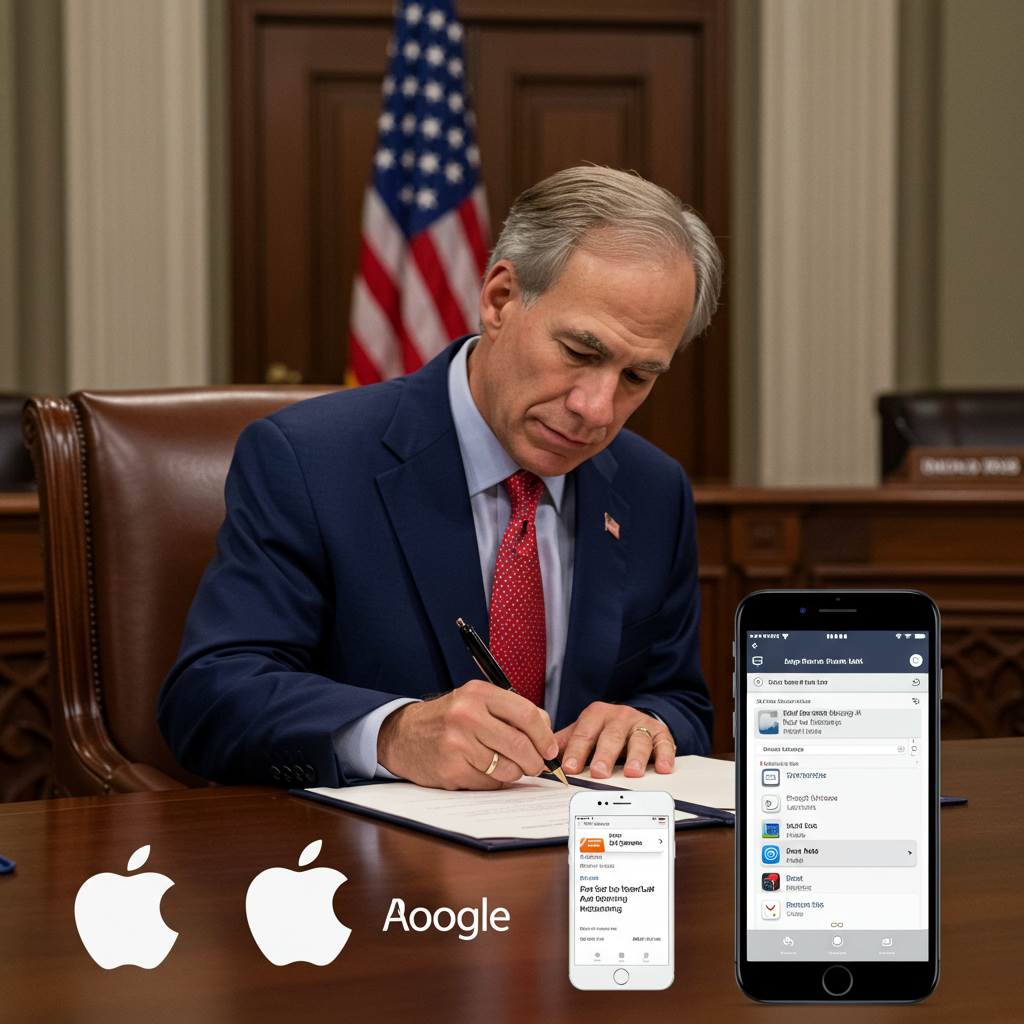Texas Mandates App Store Age Verification, Drawing Tech Giant Pushback
Texas Governor Greg Abbott has signed a new online safety bill into law, imposing significant requirements on technology companies like Apple and Google regarding the operation of their app stores within the state. The legislation targets a key entry point for digital content, mandating age verification for all Texas users and requiring parental approval for minors to download apps or make in-app purchases.
This move positions Texas, the nation’s second-most populous state, at the forefront of state-level efforts to regulate digital platforms to protect children. However, the bill immediately faced strong opposition from the very companies tasked with implementing its provisions, highlighting a growing tension between state governments and the tech industry over online safety mandates.
Key Requirements of the Texas Law
Effective January 1st, the new Texas law stipulates two primary requirements for app store providers operating in the state:
Mandatory Age Verification: Apple and Google must verify the age of all users accessing their app stores from Texas.
Parental Consent for Minors: For users identified as minors (under 18 years old), parental or guardian approval is required before they can download any app or complete any purchase within an app.
Proponents of the law argue that it is a necessary step to shield children and teenagers from potentially harmful content and unchecked spending within mobile applications.
Apple and Google Voice Strong Opposition
Despite the stated goal of protecting children, both Apple and Google have voiced significant concerns and opposition to the Texas law as it is written.
Apple, while expressing support for the broader objective of enhancing online child safety, stated that it believes “better proposals” exist. A spokesperson highlighted deep concerns about the privacy implications of the Texas bill, arguing it would necessitate app marketplaces collecting and retaining sensitive personal identifying information for every Texan who downloads any app – even simple utility apps like weather updates or sports scores. This blanket data collection requirement is a key point of contention for the company. Reports indicated that Apple CEO Tim Cook even contacted Governor Abbott prior to the signing in an attempt to prevent the bill’s passage.
Google also suggested that while legislation in this area is necessary, it needs to be structured correctly. The company has argued that accountability should be focused on social media companies whose services are often seen as the primary source of harm to children and teens, which inspired the legislative push. Both companies have reportedly suggested alternative approaches, such as sharing only age range data with apps that specifically require it, rather than providing full verification data for all downloads.
A Broader Debate: App Stores vs. Social Platforms
The Texas law brings into sharp focus a long-standing debate within the tech industry about where the responsibility for age verification and parental controls should lie. Notably, major social media companies like Meta (owner of Facebook and Instagram), Snap, and X (formerly Twitter) have expressed support for the Texas bill. They argue that the app store is the most logical and privacy-preserving “one-stop shop” for parents to verify a child’s age and manage permissions across various apps. They point out that over a third of U.S. states have introduced bills that acknowledge the central role of app stores in this process.
Child online safety groups who backed the Texas bill assert that age verification at the app store level is essential for effective parental control and argue that self-regulation in the digital marketplace has failed, with app stores prioritizing profit over child safety.
Part of a National Trend?
Texas is not the first state to enact such measures. Utah, another conservative state, adopted a similar online safety law earlier this year. These state-level actions are occurring in the absence of a comprehensive federal online safety law.
At the federal level, the Kids Online Safety Act (KOSA) has been proposed, which would require social media companies to design their platforms to prevent and mitigate harms to young users. While KOSA passed the U.S. Senate last year but stalled in the House before being recently reintroduced, it differs significantly from the Texas law by targeting social media design rather than blanket age verification at the app store level. Notably, Apple has publicly supported the federal KOSA legislation, contrasting its stance on the Texas bill.
Public opinion research suggests broad support for parental controls and age verification for online services used by children. A 2023 Pew Research poll found that 81% of Americans favor requiring parental consent for children to create social media accounts, and 71% support age verification before using social media.
The motivation behind these legislative efforts is deeply rooted in growing global concerns about the impact of social media on children’s mental health. This concern has led to actions such as dozens of U.S. states suing Meta Platforms and the U.S. Surgeon General issuing an advisory highlighting the need for safeguards for children online. Internationally, countries like Australia have already banned social media for children under 16, and Norway is considering similar rules.
This isn’t the first time Texas has used legislation to challenge the tech industry. In 2021, the state passed a law making it illegal for social media platforms to ban users based on their political viewpoints, following accusations by Republican politicians of censorship.
Legal Challenges Expected
The new Texas law is widely anticipated to face legal challenges. Experts suggest potential lawsuits based on First Amendment grounds, arguing that the law burdens the speech of adults in its attempt to regulate the speech of children and could be viewed as an unconstitutional content-based regulation specifically targeting digital communication.
The passage of this bill signifies Texas’s determined push into the digital regulatory space, placing significant pressure on major tech companies to adapt their operations within the state. It underscores the ongoing national debate about how best to protect minors online and who should bear the primary responsibility – platforms, app stores, or parents.
References
- https://www.bbc.com/news/articles/cz63ny02d8po
- https://www.bbc.co.uk/news/articles/cz63ny02d8po
- https://www.texas.gov/texas-by-texas/
- https://m.economictimes.com/tech/technology/texas-governor-signs-law-to-enforce-age-verification-on-apple-google-app-stores/articleshow/121453176.cms
- https://www.ada.gov/law-and-regs/regulations/title-ii-2010-regulations/



